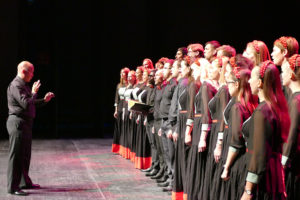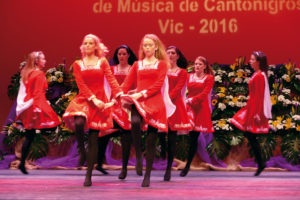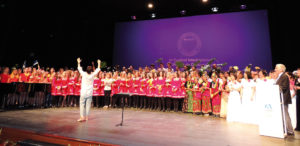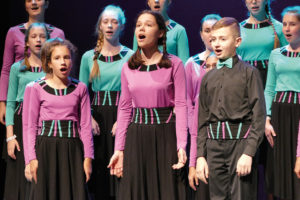Festival Internacional de Musica de Cantonigròs a Vic, 2016, So viel mehr als ein Festival...
Von Christopher Horner, Lehrer und Violonist
In dem Jahr, als Vic zum Kulturellen Zentrum Kataloniens gewählt wurde, war es zum fünften Mal in Folge Gastgeber eines der individuellsten Musik- und Tanzfestivals der Welt, des Festival Internacional de Música de Cantonigròs a Vic. Im 34. Jahr seines Bestehens ist das Festival jetzt ein unumstrittener Teil des kulturellen Erbes Kataloniens und zugleich eine Veranstaltung, die jedes Jahr viele Menschen und Nationalitäten nach Vic bringt. Während des Festivals wird die wichtige Rolle Vics als spezifisch katalanisches Kulturzentrum manchmal überschattet durch seine globale Bedeutung als Ort für internationales Zusammensein und Feiern: Die Musik- und Tanzwettbewerbe und -aufführungen des Festivals ziehen nicht nur Zuhörer und Zuschauer aus der Umgebung an; aus ganz Katalonien und anderen Ländern kommen Besucher. Es ist für das Festival von unschätzbarem Wert, dass dieses katalanische Kulturzentrum zu seinem „Heimatort“ geworden ist. Es lohnt sich deshalb, die unverwechselbare Persönlichkeit dieser Stadt zu betrachten, um die spezielle Chemie zu erfassen, die sich jedes Jahr an den vier Juli-Tagen während des intensiven Festivalprogramms entwickelt.

Die alte Siedlung Vic, in römischer Zeit gegründet, wurde bekannt als Ausa, und später bei den Wisigoten als Ausona. Daher stammt sicherlich der heutige Name der Umgebung von Vic „Osona“, einschließlich des Ortes selbst, dessen Schreibweise Vich auch verschiedentlich im Stadtbereich zu lesen ist.
Mehrere wichtige jährlich stattfindende Festivals bestätigen die Bedeutung Vics als Zentrum katalanischer Kultur. Während des Mercat Medieval de Vic ( Das katalanische Wort ‘Mercat’ bedeutet Markt oder Handel) wird das Mittelalter durch Musik und Straßenspiele wieder erlebbar, und die frohe Stimmung der festlichen musikalischen Aufführungen ziehen jedes Jahr viele Besucher nach Vic.
Die Stadt hat auch eine blühende Universität, eine der jüngsten im Land, die sich als die wichtigste außerhalb der vier führenden Städte Kataloniens etabliert hat. Es gibt auch ein bekanntes Bischöfliches Museum und ein Museum der Lederwaren. Das Seminari de Vic erinnert an die frühere Bedeutung Vics als ein Zentrum der Priesterausbildung. Heute werden seine vielen Räume als Übernachtungsquartiere für Touristen oder Konferenzteilnehmer benutzt; während des Festivals dienen sie als Unterkunft für Besuchergruppen und die zahlreichen ehrenamtlichen Hilfskräfte.

Das nahegelegene Dorf Cantonigròs war der Standort des Festivals seit seinem Beginn 1982 bis 2012, als der Präsident des Festivals, Josep Maria Busquets, den Umzug in das Atlàntida Theater im Nachbarort Vic vorschlug. Seither ist Vic der Heimatort des Festivals. Der unverwechselbare Charakter des Festivals wurde geprägt von diesem winzigen Dorf mit ungefähr 200 Einwohnern, das in der Umgebung des spektakulären Gebirgspanoramas der Plana (Ebene) de Vic liegt. Inspiriert von der Ursprungsidee des walisischen Eisteddfod wurde es geformt nach dem berühmten Welsh International Eisteddfod in Llangollen. Vieles vom Eisteddfod-Ethos wurde in der Gründungszeit übernommen. Besonders deutlich wurde das durch die großen Gruppen von Freiwilligen, anfangs hauptsächlich aus Cantonigròs und Umgebung, die der walisischen Tradition folgend, viele Jahre lang ihre Gastfreundschaft und tatkräftige Hilfe anboten. Dieser Personenkreis ist jetzt erweitert worden, damit auch Mitglieder von Jugendorganisationen aus aller Welt teilnehmen können. Diese jungen Menschen mit eindrucksvollen sprachlichen und kommunikativen Kompetenzen möchten jedes Jahr kommen und mitarbeiten. Der vereinte Einsatz dieser Gruppen ist ein entscheidender Faktor für das Fortbestehen des Festivals und des andauernden Erfolgs seines individuellen Charakters und Ethos.
Jahraus, jahrein arbeitet ein kleines, hoch motiviertes Team im Festival-Büro, während andere, darunter viele aus der Busquets Familie, die Reihen wichtiger Posten besetzen. Die Familienmitglieder, alle in ihrem eigenen Spezialgebiet hochqualifiziert, arbeiten mit dem Büroteam und den Verantwortlichen anderer Bereiche eng zusammen. Da sie während des Festivals mit den Freiwilligen mit vereinten Kräften kooperieren und ein tiefgreifendes Verständnis für das Ethos des Festivals in ihre Arbeit einbringen, erreichen sie alle zusammen mehr als die meisten Teams von doppelter Größe. Was dieses Festival unter vielen auszeichnet, ist die Tatsache, dass es als einziges Festival Mitglied des EAF (European Association of Festivals) ist und doch allein durch freiwillige Unterstützung getragen wird.
So ist es voll und ganz ein Amateurfestival in einem Verband, der solch renommierte Festivals wie das Salzburger, das Luzerner und das Flandrische zu seinen Mitgliedern zählt. Dies bestätigt nicht nur die herausragende Bedeutung des Festival Internacional de Música de Cantonigròs a Vic in den Augen der Festival-Welt, sondern ist auch ein bemerkenswerter lebendiger Beweis dafür, was durch jahrelange großzügige Unterstützung und freiwillige Arbeit erreicht werden kann.

Um ein dem Besucherandrang des Festivals entsprechendes Gebäude anbieten zu können, wurde für das 30. Jubiläum im Jahr 2012 der Umzug in das Atlàntida Theater im nahegelegenen Vic bekannt gegeben, und es wurde nun Festival Internacional de Música de Cantonigròs a Vic genannt. Obwohl es die ländliche Umgebung von Cantonigròs verlassen hatte, passte sich das Festival schnell an den besonderen Geist seiner neuen Heimat an. Mit zwei ausgezeichneten Auditorien, einer „hauseigenen“ Musikschule und einer Konzertreihe, in der Spitzeninterpreten aus aller Welt ebenso wie beliebte lokale Künstler auftreten, wurde dieses ausgezeichnete Theater ein wunderbarer Veranstaltungsort für das Festival, das sich als viel mehr als nur ein Festival erwiesen hat. Es ist in der Tat zu einem Weltzentrum der Convivència geworden. Dies ist wirklich eines jener besonderen katalanischen Wörter: Es kann einfach mit „Zusammenleben“ übersetzt werden, aber seine tiefere Bedeutung im Verlauf jener vier Tage jedes Jahr wird vermittelt, wenn die ursprünglichen Ideale des Festival-Gründers jedes Jahr vom Festival-Präsidenten, Josep Maria Busquets vorgetragen werden. Er sagt, „das gemeinsame Erleben der Kulturen und Traditionen verschiedener Nationen in der Sprache der Musik eröffnet einen Dialog des Verstehens und des Friedens“.
Beginnend mit dem herzlichen Empfang der Festival-Gemeinde durch den Ajuntament (Stadtrat)von Vic, des Atlàntida und der Einwohner von Vic ist das Festival eine wichtige und hoch geschätzte Veranstaltung im städtischen Kalender geworden.
Beim diesjährigen Festival vom 14. bis 17. Juli waren eine Reihe wunderbarer Chöre und Tanzgruppen zu Gast. Die Preise für die fünf Wettbewerbe wurden großzügig gespendet von dem Generalitat de Catalunya (der Regierung), dem Ajuntament (Stadtrat )von Vic, dem Institutió Puig Porret und dem Festival. Im Eröffnungskonzert traten einige der teilnehmenden Chöre und Tanzgruppen auf, darunter das bemerkenswerte katalanische Quartet Mèlt. Diese vier jungen Männer und Frauen, die kürzlich durch ihren Sieg in einem Talentwettbewerb des katalanischen TV3 Kanals entdeckt wurden, verzauberten das Publikum von Cantonigròs durch die Leichtigkeit, mit der sie mühelos von traditionellen Volksliedern zu zeitgenössischen Werken von beträchtlicher technischer Komplexität übergingen und alles mit absoluter Genauigkeit, echter Souveränität und der passenden Choreographie vorführten.
Der erste Preis im Wettbewerb für gemischte Chöre ging an den Cantemus Chor aus Ungarn. Dieser äußerst disziplinierte Chor hatte eine ausgezeichnete Tonqualität, großen dynamischen Umfang und eine stattliche Reihe klangvoller Stimmen. Die Frauen des Jugendchores Cantemus aus Chisinau, Moldawien,beeindruckten sehr durch die Schönheit und Genauigkeit ihres Vortrags, wofür sie den ersten Preis im Wettbewerb der Frauenchöre erhielten. Der sorgfältige Stil des APZ Tone Tomsic Chores der Universität von Ljubljana, Slowenien, war ausdrucksstark und bemerkenswert durch die Anpassungsfähigkeit innerhalb einer großen Bandbreite von Stilen und durch die Intelligenz und Feinfühligkeit seines Musizierens. Dieser Chor bekam den ersten Preis im Volksmusik-Wettbewerb.
Den Tanz-Wettbewerb gewann eine ausgezeichnete Gruppe aus Nordirland, die Folk Dancers of Loughgiel. Die Tänzer zeigten völlige Übereinstimmung im Stil und Zusammenspiel einer breit gefächerten Palette von Stilen, vorwiegend Folk; daneben dehnten sie ihr Repertoire aus in den Bereich der Crossover Werke mit einer viel komplexeren musikalischen Begleitung, wobei ihre hoch versierte Band besondere Anerkennung verdient. Und der Akkordeonspieler dieser Band bescherte mit seinem sehr bewegenden Solovortrag eines Volksliedes dem Festival einen Höhepunkt.
Als zum Abschluss des Festivals die äußerst mitreißende Hymne gesungen wurde, während sich viele Teilnehmer und Besucher unter einem Blumenregen in den Armen lagen, wurde wieder einmal allen klar, in welchem Umfang die gemeinsame Vision der Gründer, nämlich ein Dialog des Friedens, des Wissens und der Völkerverständigung, verwirklicht worden war. Das Atlàndida Theater und eindeutig auch die Stadt Vic können stolz darauf sein, dass ein solches Ereignis wie das Festival Internacional de Música de Cantonigròs a Vic an diesem Ort veranstaltet wird. Und dieses Festival trägt wiederum eine in die Zukunft leuchtende Flamme der Hoffnung nach Vic: Es manifestiert, was ein Festival erreichen kann, wenn es auf einer großen Vision basierend mit Begeisterung zum Wohle aller durchgeführt wird –mehr als die Summe seiner Teile und viel mehr als ein Festival…
Christopher Horner ist britischer Violonist, der als Solist, in Violinkonzerten und als freier Musiker in Orchestern im Vereinten Königreich, Europa und Südafrika gespielt hat. Er war von 2000 -2009 Konrektor für den Bereich Streichinstrumente am Royal Welsh College of Music and Drama. Er vereint eine rege Aufführungspraxis mit seiner Tätigkeit als Geigenlehrer, Berater im Bereich Kammermusik und Jurymitglied für alle Chor- und Instrumentalkategorien bei Festivals im ganzen Vereinten Königreich und im Ausland. Er hat eine CD mit Musik für Violine und Klavier von Juozas Gruodis mit dem Pianisten John Lenehan für das Label Discovery Music and Vision aufgenommen, und seine Einspielung der Sonate für Violine und Klavier desselben Komponisten wurde in diesem Frühjahr veröffentlicht. Er ist Prüfer am Trinity College London und seit 2013 Jurymitglied beim Festival Internacional de Música de Cantonigròs a Vic. E-Mail: Chrishorner04@gmail.com
Übersetzt aus dem Englischen von Christa Sondermann, Deutschland
